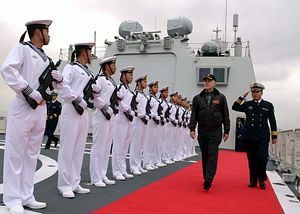Friday China links to round off the week:
Writing for Real Clear Defense, Robert C. O’Brien explores reports that China is looking to build an overseas naval base in Namibia. O’Brien notes the historical strategic importance of Walvis Bay, Namibia’s sole deep water port, adding that the South Atlantic is generally “below the radar of most policy makers today.” If the PLA Navy does construct a base at Walvis Bay, he writes, “It would have the ability to patrol the critical Cape of Good Hope around Africa and Cape Horn around South America. The approaches to the key North Atlantic sea lanes linking the Americas, Africa and Europe would be nearby.”
The question of PLA overseas bases in general was explored more fully last year in a report from National Defense University. Report co-author Christopher Yung summarized the findings in a piece for The Diplomat. Yung argues that a “dual-use” model, where ports serve both for commercial and military interests, would be China’s most likely blueprint for setting up bases overseas. I also previously explored China’s investments in Africa and how they relate to the Maritime Silk Road project.
China-Africa relations were in the headlines for an entirely separate reason this week, when a Chinese restaurant in Nairobi was accused of refusing to admit African patrons after 5 pm. “We don’t admit Africans that we don’t know because you never know who is Al-Shebab and who isn’t,” a restaurant manager told journalists, referencing the Al-Qaeda linked militant group. AFP has the story.
In other news, China announced a new phase of its attempts to pursue corrupt Chinese officials who have fled abroad. Operation “Sky Net” will involve cooperation from China’s party disciplinary commission as well as law enforcement, the central bank, and “diplomatic services.” The most important question may be how much cooperation China can get from overseas counterparts. Reports indicate the top official in charge of anti-corruption, Wang Qishan, will visit the U.S. later this year.
Speaking of Wang, The Economist did a feature on Wang, calling him the second most powerful leader in China. “Fear is Wang Qishan’s favored weapon,” the piece begins.
In military affairs, China and Pakistan pledged deeper cooperation between their navies. Pakistan’s Chief of Naval Staff Muhammad Zakaullah was in China for a visit on Thursday, and talked with his counterparts about strengthening maritime security cooperation.
Finally, your long-read for the weekend: Alice Miller of the Hoover Institution wades into the discussion of factionalism in the Chinese Communist Party. What sets Miller’s piece apart is that it seeks to analyze not the factions themselves but the discussion of supposed “factions” in Western media. The takeaway? In general, factional approaches offer “little insight into policy-making and observable policy outcomes.” As for Chinese politics, Miller argues that because Xi’s policy agenda was set forth at the 18th Party Congress, in a document shaped by his predecessor Hu Jintao, Xi is actually “pursuing a mandate” given to him by other CCP leaders.

































